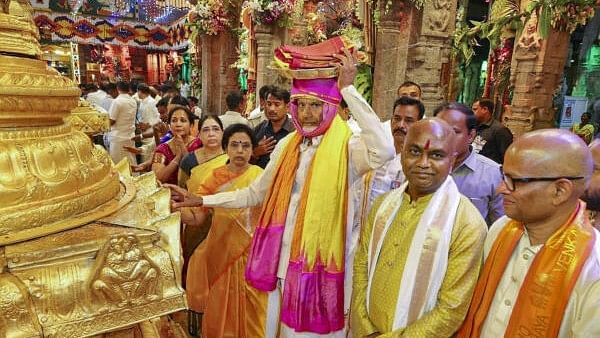
Andhra Pradesh Chief Minister N Chandrababu Naidu presents silk clothes to Lord Venkateswara on behalf of the state government during Srivari Brahmotsavam at Tirumala temple, in Tirupati district.
Credit: PTI Photo
The controversy over the alleged contamination of the laddu at the Tirumala Venkateswara temple assumed a political character and reached the Supreme Court, though there was no apparent legal issue involved in it. The politics around the issue is meant to exploit the religious sentiments of people.
The controversy started after Andhra Pradesh Chief Minister N Chandrababu Naidu announced that a laboratory report allegedly showed the presence of animal fats, including beef and fish oil, in ghee supplied to the temple used in preparing laddus, during the previous YSRCP government’s term.
Naidu’s aim was clearly political, and the Supreme Court also considered this aspect of the controversy. While dealing with petitions related to the matter, the court criticised Naidu for making public the allegations when the matter was still under investigation.
The court noted that the Chief Executive Officer of the Tirumala Tirupati Devasthanam (TTD) had stated that the adulterated ghee was never used. The court also said that Naidu “should have kept the gods away from politics” before rushing to make public statements without ascertaining facts.
It noted that Naidu behaved inappropriately for a high constitutional functionary. It was also stated that the test reports did not prima facie indicate the use of animal fat in the preparation of the laddus. “As we stand today, there is nothing to show that the ghee used was contaminated,” the court observed.
There are other facts also that have cast doubts over the controversy. The analysis done by the Gujarat-based laboratory had mentioned a range of what it considered to be “foreign fats” -- from soybean, olive, sunflower, rapeseed, and cottonseed oil, to fish oil, palm oil, beef tallow and lard. This did not point to deliberate contamination with a specific animal fat intended to hurt religious sentiments.
In the circumstances, the court had to order the formation of an “independent” Special Investigation Team (SIT) to look into the allegations. It will replace the SIT formed by the state government. The controversy and its timing had raised questions, and these could have been answered in the normal course through established methods and mechanisms.
But that would not have carried conviction in a politicised atmosphere, since the matter concerns the religious sentiments of millions of people. It is unfortunate that such matters are raked up for political gain, are taken to the highest court, and an SIT has to be formed to probe them. A nation that aspires to be ‘Viksit Bharat’ cannot afford to be repeatedly going down this path.